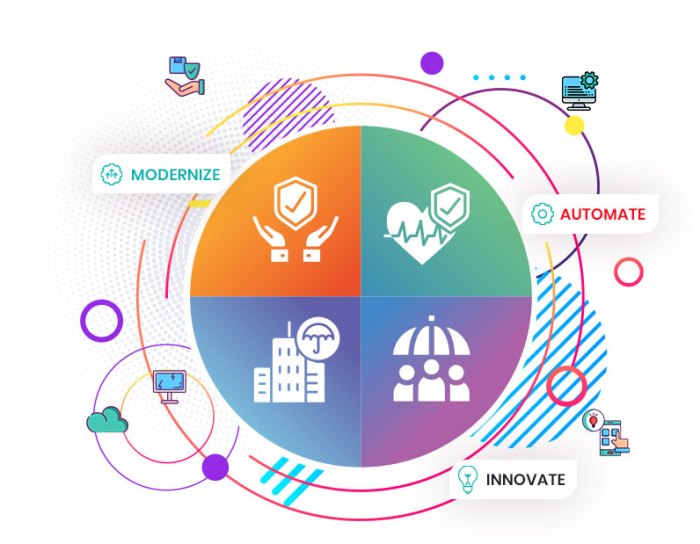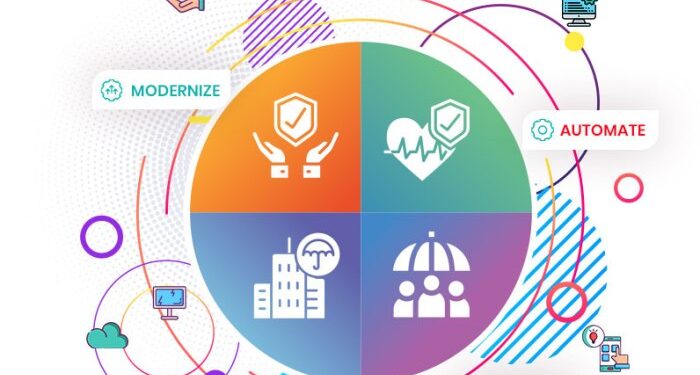As How InsurTech Is Changing the Business Insurance Industry takes center stage, this opening passage beckons readers into a world crafted with good knowledge, ensuring a reading experience that is both absorbing and distinctly original.
In the realm of business insurance, the influence of InsurTech is reshaping traditional practices and ushering in a new era of innovation.
Overview of InsurTech in the Business Insurance Industry

InsurTech, short for Insurance Technology, refers to the use of technology innovations to streamline and improve the efficiency of the insurance industry. In the business insurance sector, InsurTech is transforming traditional processes, enhancing customer experiences, and optimizing risk management strategies.
Revolutionizing the Business Insurance Sector
InsurTech is revolutionizing the business insurance sector by introducing innovative solutions that simplify complex processes, reduce operational costs, and provide better insights for decision-making. One of the key ways InsurTech is changing the industry is through the utilization of data analytics and artificial intelligence to assess risks more accurately and offer tailored insurance products to businesses.
- Improved Customer Experience: InsurTech companies are leveraging digital platforms to offer a seamless and user-friendly experience for businesses seeking insurance coverage. This includes online quotes, policy management tools, and instant claim processing.
- Risk Assessment and Management: InsurTech applications use advanced algorithms to analyze data and identify potential risks faced by businesses. By leveraging real-time data and predictive analytics, insurers can offer customized risk management solutions to minimize exposure and losses.
- Blockchain Technology: InsurTech companies are exploring the use of blockchain technology to enhance transparency, security, and efficiency in managing insurance policies and claims. Blockchain enables secure data storage and seamless transactions, reducing fraud and improving trust between insurers and policyholders.
Benefits of InsurTech for Businesses

InsurTech offers numerous advantages for businesses in the realm of insurance, revolutionizing traditional processes and enhancing efficiency and cost-effectiveness.
Streamlined Processes
- InsurTech simplifies and automates complex insurance processes, reducing the time and effort required from businesses.
- By digitizing paperwork and documentation, InsurTech minimizes errors and streamlines the claims process for quicker resolution.
Enhanced Data Analysis
- InsurTech solutions utilize advanced analytics and AI algorithms to analyze vast amounts of data, providing businesses with valuable insights for risk assessment and pricing.
- Real-time data monitoring allows businesses to make informed decisions promptly and adjust insurance coverage as needed.
Improved Customer Experience
- InsurTech platforms offer user-friendly interfaces and self-service options, enabling businesses to manage their insurance policies conveniently.
- Personalized communication and proactive risk management tools enhance customer satisfaction and loyalty.
Cost Savings
- By reducing manual processes and improving operational efficiency, InsurTech helps businesses save on administrative costs and resources.
- Dynamic pricing models and tailored insurance solutions result in cost-effective coverage that matches the specific needs of businesses.
Impact of InsurTech on Risk Assessment and Management
InsurTech is revolutionizing the way businesses approach risk assessment and management by leveraging advanced tools and technologies to make more informed decisions
Enhanced Risk Assessment Through Data Analytics
Data analytics plays a crucial role in helping businesses assess risks more accurately and efficiently. By analyzing vast amounts of data in real-time, InsurTech platforms can identify patterns, trends, and potential risks that traditional methods may overlook. This allows businesses to make data-driven decisions and tailor their risk management strategies accordingly.
- InsurTech tools can analyze historical data to predict future risks and trends, enabling businesses to proactively mitigate potential threats.
- By using predictive modeling and machine learning algorithms, InsurTech platforms can provide businesses with insights into emerging risks and suggest preventive measures.
- Real-time data monitoring allows businesses to stay updated on changing risk factors and adjust their risk management strategies promptly.
AI-Powered Risk Management Solutions
Artificial intelligence is another game-changer in the realm of risk management, offering businesses powerful tools to assess, mitigate, and manage risks effectively.
- AI algorithms can process vast amounts of data rapidly, detecting anomalies and identifying potential risks with high accuracy.
- Machine learning algorithms can continuously learn from new data inputs, improving risk assessments over time and enhancing decision-making processes.
- AI-powered chatbots and virtual assistants can provide real-time risk management support to businesses, offering immediate guidance and solutions in risk-prone situations.
Challenges and Adoption Barriers in Implementing InsurTech
The implementation of InsurTech in the business insurance industry is not without its challenges and barriers. Businesses face various obstacles when adopting InsurTech solutions, ranging from regulatory hurdles to data privacy concerns.
Regulatory Hurdles
One of the key challenges faced by businesses in implementing InsurTech solutions is navigating complex regulatory frameworks. The insurance industry is heavily regulated, and InsurTech companies must comply with various laws and guidelines to operate legally. This can be a barrier for businesses looking to adopt InsurTech, as ensuring compliance with regulations can be time-consuming and costly.
Data Privacy Concerns
Another significant barrier to the adoption of InsurTech is data privacy concerns. InsurTech solutions often involve the collection and analysis of large amounts of sensitive data, raising concerns about data security and privacy. Businesses must ensure that they have robust data protection measures in place to safeguard customer information and comply with data privacy regulations.
Strategies to Overcome Barriers
Despite the challenges and barriers, there are strategies that businesses can employ to successfully implement InsurTech solutions. One approach is to work closely with regulators to ensure compliance with existing laws and regulations. Businesses can also invest in data security measures and encryption technologies to protect sensitive information.
Additionally, partnering with InsurTech companies that have a strong track record of regulatory compliance and data security can help mitigate risks associated with adopting InsurTech.
Ending Remarks
In conclusion, the transformative power of InsurTech in the business insurance sector is undeniable. Embracing these technological advancements is key to staying competitive and thriving in the ever-evolving landscape of risk management.
User Queries
How does InsurTech impact traditional insurance processes?
InsurTech streamlines operations, automates tasks, and provides real-time data analysis, enhancing efficiency and accuracy compared to traditional methods.
What are some common challenges faced in implementing InsurTech solutions?
Businesses often encounter issues related to data privacy concerns, regulatory compliance, and the need for upskilling employees to adapt to new technologies.
How does InsurTech leverage data analytics and AI for risk management?
InsurTech utilizes advanced algorithms to analyze vast amounts of data quickly, enabling better risk assessment, fraud detection, and personalized insurance products.



